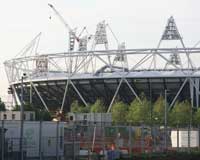In July last year the capital was gearing up for the start of London 2012. One year on, is the legacy potential of the Olympic Games being fulfilled? Mark Simmons reports
This is an opportune time for Clive Dutton to consider what lasting impact the 2012 Games have had on London. Feted as a regeneration specialist, he hung up his public sector gloves at the end of May, stepping down as executive director of regeneration at Newham. His arrival there in 2009 was something of a coup for the London borough, which headhunted him from a similar position in Birmingham.
And for Dutton the opportunity to be in the thick of the Games was too good to pass up. Now that they are over, and he starts a new life as a private consultant, he is no less chirpy about the 2012 effect than he was four years ago. And if he has any regrets about things that weren’t achieved or are unlikely to be, but could have been, he isn’t telling.
Instead he is keen to remember that when London was selected over other potential host cities, notably Paris, it was the kind of regeneration legacy that London could provide that struck a chord with the Olympic Committee.
Is London living up to its promises? Dutton thinks so: “The £9bn that was invested has pushed east London ahead by 30 years.” New buildings and particularly new transport facilities and rolling stock provide a firm foundation for growth. “That kind of investment was a rarity in the UK, where we tend to retrofit our existing infrastructure and also take an eternity to do it!” he grins. He is also chuffed with the creation of Westfield Stratford and the 9,000 jobs that were generated, a third of them for the unemployed of Newham.
Unpicking Olympic legacy from what would have happened in and around Newham is difficult. Under Dutton’s watch the Royal Docks achieved Enterprise Zone status – the only one in London – and represents the majority of land owned by the Greater London Authority. He describes development now taking place as “game-changing”, though he admits there is work to do. Connecting the Royal Docks with Stratford and Old Street is important, he says, as are the proposed Thames crossings at Silvertown and Gallions Reach.
“The Games reaffirmed London’s position as the capital city of the world,” he says, adding: “The public sector has done the heavy lifting and the remainder will come from the private sector. There is a new development pragmatism – a recognition that we have got to build affordable workspace as well as grade A office space.”
What do the rest of EG’s London forum think?
Baroness Jo Valentine, chief executive, London First
“Hosting the 2012 Games gave London and the UK a confidence boost. The way the capital worked impressed investors and visitors around the world. Now the challenge is to secure the economic legacy. We want the Olympic Park to act as a catalyst for further regeneration of east London. Crossrail will help, but we need Boris to back two new river crossings. Sticking with transport, let’s retain the more imaginative management that we saw during the Games, such as night-time deliveries, co-ordinated roadworks and extended tube running hours.
Thanks to our CompeteFor website, small businesses were able to bid for Olympic contracts. An immediate legacy win is that contracts are still being placed on it, by the legacy company, Crossrail and the Mayor’s office. On jobs, 30,000 youngsters attend our annual “Skills London” jobs fair but we want to see regeneration bringing more jobs for east Londoners of all ages. A year on from the Games, London should be proud of what it has achieved. Let’s keep going.”
Nigel Kempner, executive director, Quintain
“The legacy left by a major event such as the Olympic Games is multi-faceted. I have had feedback from international investors saying just how well the event showcased London and how it contributed to the city’s continued reputation as a cultural and financial centre. London development is high on the political agenda at the moment brought to the fore by a significant housing shortage. It is staggering to think that 20,000 fewer homes are being built in London every year than we believe London requires.
The success of the London Olympic Games has brought with it a willingness to invest and we will see the rewards from this for years to come, perhaps even generations. It is also clear that popularity of location in London is moving east not west and this will continue.”
Fred Hargreaves, ?executive director, BNP Paribas Real Estate
“The 2012 Olympic Games launched Stratford City, E20, as London’s newest business district – seldom has a business centre received as much national and international coverage. The heavy passenger loads imposed by the Games also helped to prove the transport network’s capability, endorsing it as east London’s most accessible office/residential location.
Impressively, the legacy ultimately helped to accelerate the redevelopment of this part of east London, although this was already an area ripe for development. The holding of the Games created a fully serviced new district within a matter of years – where ordinarily this type of scheme takes a generation to deliver. The amenities available are world-class, and include new parks, housing, educational facilities and the retained stadia. Another major part of the legacy will be the success of Stratford City’s office schemes, which were launched in conjunction with the Games.”











